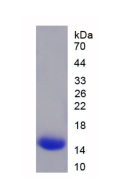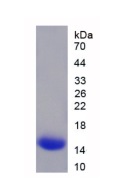Recombinant Tumor Necrosis Factor Ligand Superfamily, Member 13 (TNFSF13)
| Product name: | Recombinant Tumor Necrosis Factor Ligand Superfamily, Member 13 (TNFSF13) |
| Source: | E. coli |
| Purity: | > 97% |
| Buffer Formulation: | 100mMNaHCO 3 , 500mMNaCl, pH8.3, containing 0.01% SKL, 5% |
| Applications: | Positive Control; Immunogen; SDS-PAGE; WB. |
| Storage: | Avoid repeated freeze/thaw cycles. |
| UOM: | 50µg/200µg/1mg/5mg |
Recombinant Tumor Necrosis Factor Ligand Superfamily, Member 13 (TNFSF13)
[ PROPERTIES ]
Source: Prokaryotic expression
Host: E.coli
Residues: Ala105~Leu250
Tags: N-terminal His Tag
Subcellular Location: Secreted
Purity: > 97%
Traits: Freeze-dried powder
Buffer formulation: 100mMNaHCO 3 , 500mMNaCl, pH8.3, containing 0.01% SKL, 5%Trehalose.
Original Concentration: 200µg/mL
Applications: Positive Control; Immunogen; SDS-PAGE; WB.
(May be suitable for use in other assays to be determined by the end user.)
Predicted isoelectric point: 9.6
Predicted Molecular Mass: 17.6kDa
Accurate Molecular Mass: 15kDa as determined by SDS-PAGE reducing conditions.
[ USAGE ]
Reconstitute in 100mM NaHCO 3 , 500mM NaCl (pH8.3) to a concentration of 0.1-1.0 mg/mL. Do
not vortex.
[ STORAGE AND STABILITY ]
Storage: Avoid repeated freeze/thaw cycles.
Store at 2-8ºC for one month.
Aliquot and store at -80ºC for 12 months.
Stability Test: The thermal stability is described by the loss rate. The loss rate was determinedby accelerated thermal degradation test, that is, incubate the protein at 37°C for 48h, and noobvious degradation and precipitation were observed. The loss rate is less than 5% within theexpiration date under appropriate storage condition.
[ SEQUENCE ]

[ IDENTIFICATION ]

Figure. SDS-PAGE
[ IMPORTANT NOTE ]
The kit is designed for research use only, we will not be responsible for any issue if the kit wasused in clinical diagnostic or any other procedures.














